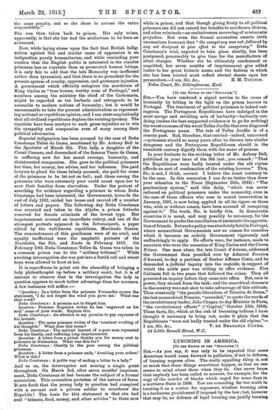[To THE EDITOR OF TI18 "SPECTATOR. "]
Srn,—You have rendered a signal service to the cause of humanity by letting in the light on the prison horrors in Portugal. The treatment of political prisoners is indeed out- rageous. The Portuguese Republicans have indulged in the most savage and revolting acts of barbarity—barbarity out- doing (unless the best-supported evidence is to go for nothing) the worst excesses of the worst Telles Jordiio that ever disgraced the Portuguese name. The tale of Telles Jordio is of a remote past. Sad, therefore, that untried—indeed, unaccused —prisoners should so many years after be thrown into similar dungeons and the Portuguese Republicans should in the twentieth century dignify them with the name of prisons.
In your footnote to the striking letter of Mr. Aubrey Bell, published in your issue of the 8th inst., you remark : " That the Republicans were badly treated under the old regime affords no sort of condonation of the existing horrors." This, Sir, is not, I think, correct. I believe the exact contrary to be the case. In this connexion I can do no better than draw your attention to the Times (September 25th, 1912) : " The penitentiary system," said this daily, " which was never enforced on political prisoners under the monarchy, even in the case of those officers who rose in armed insurrection in January, 1891, is now being applied in all its rigour on those who, with or without reason, have been accused of conspiring against it." The truth, Sir, is briefly this. In democratio countries it is usual, and may possibly be necessary, for the Government to prefer the conciliation of enemies to the apprecia- tion of friends. But such a policy was absolutely fatal in Portugal, where monarchical Governments saw no reason for remedies which it becomes an orderly Government vigorously and unflinchingly to apply. No efforts were, for instance, made to ascertain who were the assassins of King Carlos and the Crown Prince. One man alone, the late Count d'Arnoso, addressed the Government then presided over by Admiral Ferreira d'Amaral, to-day a partisan of Senhor Affonso Costa, and he demanded a judicial inquiry into the regicide, in support of which the noble peer was willing to offer evidence. Five Cabinets fell in two years that followed the crime. They all promised an inquiry before they came into office. But, once in power, they shrank from the task; and the anarchical elements in the country were not slow to take advantage of this attitude. Thus eventually "the pseudo-liberalism of Teixeira de Sousa," the last monarchical Premier, "seconded," to quote the words of the revolutionary leader, Joao Chagas, to-day Minister in Paris, " the revolutionary efforts " (" Capital," October 13th, 1910). These facts, Sir, which at the risk of becoming tedious I have thought it necessary to bring out, make it plain that the Republicans "were not badly treated under the old regime."--














































 Previous page
Previous page